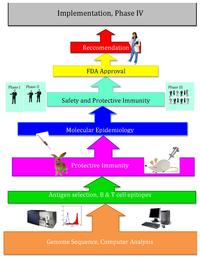
Photo from wikipedia
The ongoing, and very serious, threat from antimicrobial resistance necessitates the development and use of preventative measures, predominantly vaccination. Polysaccharide-based vaccines have provided a degree of success in limiting morbidity… Click to show full abstract
The ongoing, and very serious, threat from antimicrobial resistance necessitates the development and use of preventative measures, predominantly vaccination. Polysaccharide-based vaccines have provided a degree of success in limiting morbidity from disseminated bacterial infections, including those caused by the major human obligate pathogens, Neisseria meningitidis, and Streptococcus pneumoniae. Limitations of these polysaccharide vaccines, such as partial coverage and induced escape leading to persistence of disease, provide a compelling argument for the development of protein vaccines. In this review, we briefly chronicle approaches that have yielded licensed vaccines before highlighting reverse vaccinology 2.0 and its potential application in the discovery of novel bacterial protein vaccine candidates. Technical challenges and research gaps are also discussed.
Journal Title: Frontiers in Immunology
Year Published: 2018
Link to full text (if available)
Share on Social Media: Sign Up to like & get
recommendations!